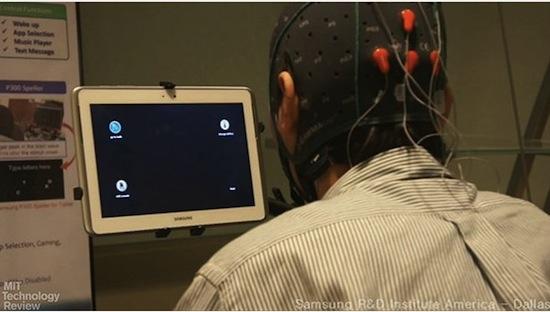
Samsung recently unveiled Air Gestures with the latest version of TouchWiz UX on board the Galaxy S 4. This feature utilizes touchless touchscreen technology to reference inputs as normal touch points do without actually contacting the touchscreen. The idea sounds somewhat ridiculous, and I'm definitely not convinced of its practicality yet, but that hasn't stopped Samsung from going one step further in the touchless touchscreen endeavor by testing mind control with a Galaxy Note 10.1.
Researchers at the University of Texas have been experimenting with EEG caps to find a unity between smartphone and human in order to make the two interact without physical inputs. The current prospective uses center around individuals with disabilities and I'm inclined to believe the boundaries are endless. But of course, Samsung's end goal is not as nearsighted as my own. They hope to put this into mainstream practice while individuals with disabilities are merely an afterthought of this technology.
The test subject of mind control is a Samsung Galaxy Note 10.1 controlled by brain waves that gather data on how a brain-computer interface could aid in touchless input tasks on a smartphone. Eventually, Samsung is hoping to put mind control into practice.
Controlling inputs of a smartphone's display more accurately is not a new phenomenon, just ask Professor Xavier. And what Samsung hopes to do with this technology aligns with its current goals of their Galaxy brand. They hope to push this to the mainstream, no doubt in hopes of gaining a competitive advantage in the smartphone realm. Just don't get your hopes up for an ETA.
MIT students have teamed up with the University of Texas, Dallas, in studing repetitive visual patterns which has resulted in the following: people can actually select and launch apps by focusing on a blinking icon making a distinctive frequency. The result is in the ballpark of 80 to 95 percent accuracy in selections made within just seconds of eachother.
Though hardly instantaneous, imagine the possibilities once EEG technology is harnessed to the point that one does not even have to focus on the icon in order to make the selection! Do you know what you want to eat? You may be thinking "no" but your brain has already thought of "steak." Now your smartphone has searched steak houses nearby and sorted them by reviews, since you don't like bad steak, and made a reservation, despite not knowing which is the best. Useful, but dangerous.
The possibilities for this sort of technology rivals Google Now of today's technology. This immediacy that we have grown accustomed to is on the verge of evolving, or so Samsung believes, into mind control and I'm enamored by its possibilities.
At any given moment, we need only think of a question and our devices will propose us the answer. The tendency to believe that we need only touch, speak, or physically interact with our mobile devices is on the brink of being outdated. After all, these inputs have been around for quite a while.
Samsung's Insoo Kim, lead researcher in finding new ways to interact with devices says, "Several years ago, a small keypad was the only input modality to control the phone, but nowadays the user can use voice, touch, gesture, and eye movement to control and interact with mobile devices." Kim went on to say "Adding more input modalities will provide us with more convenient and richer ways of interacting with mobile devices."
However, the remaining hurdle for mind control as the medium between interacting with devices is the head piece required of EEG. Once Google Glass is widely available, those who have made the leap to wearable tech might have grown accustomed to such a complementary device, but for the time being, a head piece will no doubt be deemed alien.
I am all for new ways to interact with technology. Mind control may sound foreign at first, but it's no less believable than Samsung's Air View and Air Gestures which utilize touchless touchscreen technology.
How do you think we will interact with our smartphones in the future? Is mind control practical, or is Samsung embarking down a path not worth the research and development costs? Hit the comments and share your thoughts below!
Image via Techhive.